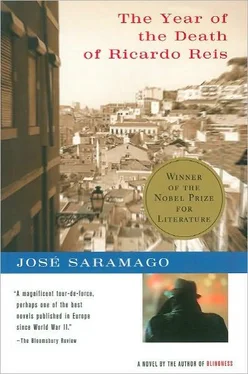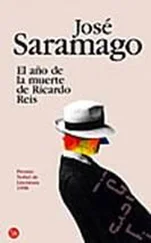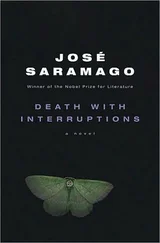José Saramago - Year of the Death of Ricardo Reis
Здесь есть возможность читать онлайн «José Saramago - Year of the Death of Ricardo Reis» весь текст электронной книги совершенно бесплатно (целиком полную версию без сокращений). В некоторых случаях можно слушать аудио, скачать через торрент в формате fb2 и присутствует краткое содержание. Год выпуска: 1992, ISBN: 1992, Издательство: Houghton Mifflin Harcourt, Жанр: Современная проза, на английском языке. Описание произведения, (предисловие) а так же отзывы посетителей доступны на портале библиотеки ЛибКат.
- Название:Year of the Death of Ricardo Reis
- Автор:
- Издательство:Houghton Mifflin Harcourt
- Жанр:
- Год:1992
- ISBN:9780547546926
- Рейтинг книги:4 / 5. Голосов: 1
-
Избранное:Добавить в избранное
- Отзывы:
-
Ваша оценка:
- 80
- 1
- 2
- 3
- 4
- 5
Year of the Death of Ricardo Reis: краткое содержание, описание и аннотация
Предлагаем к чтению аннотацию, описание, краткое содержание или предисловие (зависит от того, что написал сам автор книги «Year of the Death of Ricardo Reis»). Если вы не нашли необходимую информацию о книге — напишите в комментариях, мы постараемся отыскать её.
Year of the Death of Ricardo Reis — читать онлайн бесплатно полную книгу (весь текст) целиком
Ниже представлен текст книги, разбитый по страницам. Система сохранения места последней прочитанной страницы, позволяет с удобством читать онлайн бесплатно книгу «Year of the Death of Ricardo Reis», без необходимости каждый раз заново искать на чём Вы остановились. Поставьте закладку, и сможете в любой момент перейти на страницу, на которой закончили чтение.
Интервал:
Закладка:
At the station in Fatima, the train emptied. Stirred by the odor of sanctity in the air, pilgrims jostled each other, there was alarm and confusion as families suddenly found themselves divided. The broad open space resembled a military encampment preparing for a battle. Most of the pilgrims will make the twenty-kilometer journey on foot to the Cova da Iria, but some rush to join the lines for buses, these are the pilgrims with weak legs and little stamina, who tire at the slightest exertion. The sky was clear, the sun bright and warm. Ricardo Reis went off in search of a place to eat. There were plenty of street vendors selling pancakes, cheesecakes, biscuits from Caldas, dried figs, pitchers of water, fruits in season, garlands of pine kernels, peanuts, and pips and lupine seeds, but not a single restaurant worthy of the name. The few eating houses were full, the taverns were packed to the door, he will need a lot of patience before he finds himself seated in front of a knife and fork and a plate of food. Yet he benefited from the Christian spirit that permeated this place, for when they saw him so smartly turned out in his city clothes, a number of customers in the line, like good provincials, allowed him to go before them, thus Ricardo Reis was able to have his lunch sooner than he had hoped, a little fried fish with boiled potatoes dressed with oil and vinegar, then a couple of scrambled eggs. He drank wine that tasted like altar wine, ate good country bread, moist and heavy, and having thanked his hosts he went to look for transportation. The square was less crowded, ready for another trainload from the south or north, but pilgrims steadily continued to arrive on foot from remote parts. A bus gave a raucous honk, touting for passengers to fill the few remaining empty seats. Ricardo Reis, breaking into a trot, stepping over baskets and bundles of mats and blankets, managed to obtain a seat, a major struggle for a man who is trying to digest his food and is exhausted by the heat. Rattling loudly, the bus pulled away, sending up clouds of dust from the poorly paved road, and the filthy windows barely allowed one to catch a glimpse of the rolling, arid land. The driver honked without respite, sending groups of pilgrims scattering into the ditches at the side of the road, steered sharply to avoid potholes, and every few minutes spat noisily out an open window. The road swarmed with an endless column of pilgrims on foot, but there were also wagons and ox-driven carts, each advancing at its own pace. From time to time an expensive limousine with a chauffeur in livery would pass, sounding its horn, carrying elderly women dressed in black or gray or midnight blue, and corpulent gentlemen in dark suits with the circumspect air of those who have just finished counting their money only to find that it has multiplied. The occupants could be seen when the limousine was forced to slow down because of some large procession of pilgrims led by their parish priest, the priest acts as both spiritual and tour guide, and deserves our praise for making the same sacrifices as his flock, on foot like them with his hooves in the dirt. The majority of the faithful walk barefoot. Some carry open umbrellas to protect themselves from the sun, these are people with delicate heads, not of the lower orders, and prone to fits of fainting and vertigo. The hymns they sing out of tune. The shrill voices of the women sound like an endless lamentation, a weeping as yet without tears, and the men, who nearly always forget the words, sing only the rhyming syllables by way of accompaniment, in a sort of basso continuo, no more is asked of them, only that they keep up the pretense. From time to time people can be seen sitting along hedgerows under the shade of trees, gathering strength for the final stretch of the journey, taking advantage of this pause to nibble a chunk of bread and sausage, a cod fritter, a sardine fried three days ago back in their obscure village. Then they get back on the road, feeling restored. Women carry baskets of food on their heads, some even suckle infants as they walk, and the dust descends on them all in clouds as yet another bus goes past, but they feel nothing, pay no attention, it shows what habit can do. Sweat trickles down the foreheads of monk and pilgrim, forms tiny channels in the dust, they wipe their faces with the back of their hands, worse than they thought, this is not just dirt but mud. The heat blackens their faces, yet the women do not remove the kerchiefs from their heads and the men keep on their jackets, they neither undo their shirts nor loosen their collars. This race preserves unawares the custom of the desert, which says that what protects from the cold protects also from the heat, therefore they wrap up as if to conceal themselves.
At a bend in the road a crowd has gathered under a tree, people are shouting, women are tearing their hair, and the body of a man is stretched out on the ground. The bus slows to allow the passengers to watch this spectacle, but Ricardo Reis says, or rather shouts to the driver, Stop here, let me see what has happened, I'm a doctor. Murmurs of protest can be heard, the passengers are in a hurry to reach the land of miracles, but they soon quiet down, anxious not to appear hard-hearted. Ricardo Reis got off, pushed his way through the crowd, knelt in the dust at the old man's side, and felt the artery in his neck. He is dead, he said. He need not have bothered interrupting his journey just to make this announcement. The news provoked a renewed outburst of tears, the dead man had numerous relatives, but his widow, a woman even older than the dead man, who now was no age, looked at the corpse with dry eyes, only her lips trembled as she stood there twining the fringes of her shawl. Two of the men in the crowd got on the bus, to report the death to the authorities in Fatima, who will make arrangements for the corpse to be taken away and buried in the nearest cemetery. Ricardo Reis has returned to his seat on the bus, now the object of everyone's curiosity, Fancy that, we have a doctor in our midst, who could ask for more reassuring company, even though he did nothing on this occasion but confirm a death. The two men inform those around them, He was already very sick when he got here, he should have stayed home, but he insisted on coming, he said he would hang himself from the rafters of the house if we left him behind, in the end he died far from home, no one escapes his destiny. Ricardo Reis nodded in agreement, not knowing that his head was moving. Yes sir, that's destiny, let's hope someone sticks a cross under that tree so future travelers can say a paternoster for the soul of one who died unconfessed and without receiving the last rites of the Church though he was already heading for heaven the moment he left his house. If this old man were called Lazarus and Jesus Christ appeared at the bend in the road on His way to the Cova da Iria to witness the miracles, He would understand at once what had happened, having experience in such things, and would elbow His way through all those gaping onlookers, and if anyone tried to stop Him, Jesus Christ would rebuke him, saying, Don't you know who you're talking to. Going up to the old woman who finds herself unable to weep, He would say, Leave this to me, and take two steps forward, make the sign of the Cross, remarkable prescience on His part, since we know that He has not been crucified yet, and He would cry out, Lazarus, arise and walk, whereupon Lazarus would get to his feet, another miracle. Lazarus would embrace his wife, who could now weep at last, and everything would be as before, and when the wagon came with the stretcher bearers and the authority to take away the body, someone would be sure to ask, Why are you looking for a dead man among the living, he is not here, he has been brought back to life. But in the Cova da Iria no such miracle, hard as people tried, was ever achieved.
Читать дальшеИнтервал:
Закладка:
Похожие книги на «Year of the Death of Ricardo Reis»
Представляем Вашему вниманию похожие книги на «Year of the Death of Ricardo Reis» списком для выбора. Мы отобрали схожую по названию и смыслу литературу в надежде предоставить читателям больше вариантов отыскать новые, интересные, ещё непрочитанные произведения.
Обсуждение, отзывы о книге «Year of the Death of Ricardo Reis» и просто собственные мнения читателей. Оставьте ваши комментарии, напишите, что Вы думаете о произведении, его смысле или главных героях. Укажите что конкретно понравилось, а что нет, и почему Вы так считаете.












